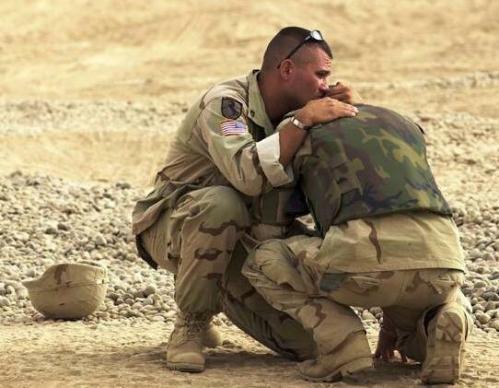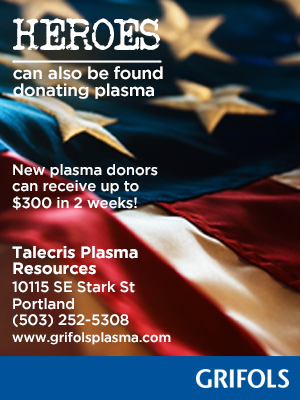
According to a 2014 report on “Removing Barriers to Mental Health Services for Veterans” from the American Public Health Association (APHA), rates of trauma and mental illness are disproportionately high among American veterans. For a variety of reasons, including mental health challenges, veterans are at risk of family instability, elevated rates of homelessness and joblessness.
The APHA report stated that "the wars in Iraq and Afghanistan have the longest sustained U.S. military operations since the Vietnam era, sending more than 2.2 million troops into battle and resulting in more than 6,600 deaths and 48,000 injuries. Studies indicate that 56 percent to 87 percent of servicemembers experiencing psychological distress after deployment report that they did not receive psychological help. Barriers to care after civilian reentry further disadvantage this already vulnerable population. Although lack of education and limited transferable skills from military to civilian life are significant causes of these problems, physical and mental health problems are also factors."
The report also identified that "veterans have disproportionate rates of mental illness, particularly post-traumatic stress disorder (PTSD), substance abuse disorders, depression, anxiety and military sexual trauma. Nearly 50 percent of combat veterans from Iraq report that they have suffered from PTSD, and close to 40 percent of those same veterans report problem alcohol use."
“I’m actually a survivor of two suicide attempts. Both times I was still in uniform,” said David Donaldson, a combat veteran who served two tours in Iraq as an infantryman in the U.S. Army National Guard. “I knew just being in uniform you have a 30 percent higher chance, even if you didn’t deploy, of completing suicide. It’s just that much higher because of stress and everything else that you’re a part of.”
After returning from his first deployment, Donaldson was diagnosed with PTSD and struggled to maintain employment as he bounced from one job to another. The Florida native relocated to Arizona, hoping to start life anew.
“I was homeless and had been homeless for about six months,” he said. “Then I found out that there was a deployment at the time. I volunteered for a second tour. That was the only thing that saved me – it gave me a place to stay and it gave me a job to do. I had some pay coming in.”
Unfortunately, Donaldson endured a traumatic brain injury due to an improvised explosive device. As a result, he had to receive two and a half years of rehabilitative speech therapy upon returning home.
Still unable to hold a job as he struggled with PTSD, Donaldson tried his luck again and moved to Alabama. But things unfortunately got worse after a visit to the VA left him devastated – Donaldson was rated at 90 percent disabled and learned that he could no longer serve in the military.
Donaldson, overwhelmed with all that he had been through, began to self-medicate with hallucinogens and alcohol. “I was drinking pretty heavily and was just slipping,” he said. “I decided (to change my ways after I overdosed and ended up) in the ER. My wife gave me an ultimatum at the time, saying ‘it’s either us or that’ (as) we already had a daughter. So I wanted to make a switch and started reaching out to (and volunteering for) different programs.”
Donaldson eventually found his calling back to Arizona where he currently works as a peer support specialist for the Phoenix VA Health Care System. He, along with fellow combat veteran James Loehr, have been trained to help others with mental health and/or co-occurring conditions, as well as identify and achieve specific life and recovery goals.
“When you’re in recovery yourself, it’s so easy to slip if you’re not taking care of yourself,” said Donaldson. “That’s when I started really learning the essence of peer support and finding out it’s not just about helping someone. You’ve also been in those shoes and you’ve tried figuring it out for yourself, and now you’re trying to do it for other people as a peer.”
Like Donaldson, Loehr, an Iraq combat veteran who joined the military in 1997, experienced homelessness having lived out of his car and couch-surfed for about eight months. He was also diagnosed with PTSD and struggled to find employment as he readjusted to civilian life.
“I was just frustrated because I did everything right by society’s standards – I’m a decorated hero with a degree, with an extensive leadership background and all these things. But I couldn’t get in anywhere,” Loehr said. “It was really, really hard. My symptoms were getting worse and I started drinking for three reasons – to try to deal with my anger issues and adjustment issues, as well as try to get the memories of what took place (during my tour in Iraq) out of my head. And also to just sleep because I couldn’t sleep. I was spiraling out of control. I would drink (until I blacked out) and months would past. I wouldn’t know what month it was. It was just really bad.”
VA peer support specialists help veterans navigate the VA system and they serve as role models by sharing their personal recovery stories as a way of showing that recovery from mental illness is possible.
According to the Department of Veterans Affairs website, "VA values peer specialists as a unique source of knowledge and strength that other mental health practitioners can’t provide. One of their strengths is being able to advocate for themselves and the veterans they work with to achieve a level of respect and acceptance of themselves as a person who has a mental health condition."
“I found myself homeless and by that time, my tour money was running out,” said Loehr. “I got more and more pissed off so I decided to ghost myself and took to the streets. (But then) a Vietnam veteran named Bob found me and he just started asking me lots of questions and told me, ‘It gets better with time. Society doesn’t understand.’ He was essentially peer supporting me before I knew what peer support was.”
Loehr eventually went to the VA for help and received treatment for his PTSD diagnosis. Thanks to divine intervention and a newfound faith in God, Loehr said things finally started looking up.
“Since war and everything, I just kind of let go of my faith practices,” he said. “I started going to church … and met the pastor. The pastor and his wife allowed me to live in their home for a couple of months while I found work. Finally, things were starting to go my way as I was seeking treatment to understand what was going on. It was awesome. (I didn’t know it at the time), but Bob and a lot of the other Vietnam veterans were a support group (who) were with The American Legion.”
After completing his PTSD treatment in California, Loehr was eager to switch career fields and do more to help veterans. He also felt it was time to reintegrate with his family.
Loehr relocated to Missouri where he joined St. Charles Legion Post 312 and became good buddies with the post commander and members who were looking to start an American Legion Riders chapter. “They changed my life. They saved me,” said Loehr. “They were supportive and encouraged me to work for the VA. So I did and then the VA approached me as a volunteer.”
Once again, divine intervention would have it. Loehr was introduced to the VA’s new peer support specialist program and later hired as one of the first paid specialists upon its launch in 2012.
Loehr said peer support specialists are people who are able to talk about their issues candidly and offer helpful tools that they use to manage their lives, to help others.
“The biggest thing that I was gifted by becoming a peer support is now I have purpose in my life again,” he said. “I’m essentially just a battle buddy for the veteran in front of me and I want to help them overcome their barriers and figure out their next steps in their recovery. I have a big group of veterans that I provided services for and a few of them are now peer support specialists themselves.”
Having only worked for the Phoenix VA since May 2016, Loehr is already helping veterans live life to the fullest.
Part of Loehr’s remarkable success involves a story about a Vietnam-era veteran, whom Loehr helped "bring back from the dead" after the man endured 37 years of being homeless with no known identification or living relatives.
After an unsuccessful attempt to try and get an ID card from the motor vehicle department, Loehr went to a Social Security office where he learned shocking news about the 72-year-old man.
“The supervisor came out and was like, ‘Look, this Social Security number is for a deceased person. He was reported deceased in 1970,’” said Loehr. “So, I had to get creative. I contacted the National Military Personnel Records Archive Center and asked them to physically pull his fingerprint record from when he enlisted into the military. Two months after I made the call and talked to one of the lead investigators there they were able to obtain his physical fingerprint record. Social Security was finally able to overturn his record and reestablish the veteran as living, and we were able to get him an ID and enrolled in the VA. We’re still battling it out with the Social Security department to get him his back pay for all the disability payments.”
Loehr said the veteran now lives in an apartment and will be receiving his monthly Social Security payments. “That’s how I got first runner-up for Social Work Service Employee of the Year this year,” he said. “Anyone that lives on this earth is recovering from something that happened to them. It’s how we go about that recovery that really sets the tone of our character and who we are.”
For Donaldson, the essence of being a peer support specialist is being able to make an authentic connection with veterans. His greatest joy is being able to help veterans get from point A to point B, whether that entails advocating for higher level of care, find safe housing or ensuring that veterans get the services they deserve and fought to have.
“It is because of this job and helping other veterans, as a vet myself, that I’m able to continue on,” said Donaldson.
Donaldson hopes to continue empowering others to make positive changes by showing that recovery from PTSD is possible.
“When you’re able to reach out after somebody has experienced combat or maybe was on the street for 10-plus years and is finally able to get those services, that’s true victory,” said the married father of two. “Taking somebody out of that darkness and saying, ‘Hey, you can do this,’ and you get them on track, then all of a sudden, they’re out there doing the same thing for somebody else, and it replicates and it spreads in the veteran community. That’s the victory – that’s the most pleasure that I get.”
“(Donaldson and Loehr) are a huge help,” said Army veteran Michael Leon, who is the assistant chief of social work for the Phoenix VA Health Care System. “It’s very hard for the average person who’s never been there, who’s not in recovery or may have no military experience, to go out there and connect to these veterans. We can’t survive without our peers out there in the community.”
By Johnathon Clinkscales



